 rUNSWift |
Team Contact: Institutes: |
| Team Profile: |
UNSW has had amazing success in the Legged League of RoboCup since it first participated in the 1999 competition. To date, they have come second twice and first three times! Unusual within the league, rUNSWift has always had a team of final-year undergraduates working on the project as their thesis topic. This creates an extra challenge as each year we have to start with an entirely new batch of students.
See
http://www.cse.unsw.edu.au/~robocup/history.phtml for more detail. |
| Research Topics: | UNSW has pursued a number of research topics throughout its RoboCup career. The overarching principle is to pursue research where it is needed, rather than concentrating on one particular part of the soccer agent. This has led to research in many areas from locomotion to machine learning to multi-agent co-operation. |
| Team Report: | rUNSWift2004.tgz |
|
|
|
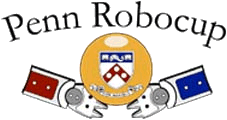 UPENNALIZERS |
Team Contact: Institutes: |
| Team Profile: | 5 years participation, 2nd in ’03 |
| Research Topics: |
Machine learning, biologically inspired sensorimotor processing
|
| Team Report: | UPenn04.pdf |
|
|
|
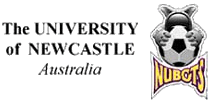 NUbots |
Team Contact: Institutes: |
| Team Profile: | 3rd place at RoboCup 2002 and 2003, team uses ERS-7 robots |
| Research Topics: |
control, bayesian statistics, machine learning, robot vision, neurocomputing, dimensionality reduction, kernel machines
|
| Team Report: | NUbotFinalReport2004.pdf |
|
|
|
 CM-Pack’04 |
Team Contact: Institutes: |
| Team Profile: |
The CMPack and the initial CMTrio teams have participated in the RoboCup international and local competitions since 1998, taking first place several times. Recently, we were awarded first place in the RoboCup US Open 2004.
|
| Research Topics: |
Multirobot systems, learning, teamwork, communication, collaboration, vision, perception
|
| Team Report: | cmpack04_team_report.pdf |
|
|
|
 GermanTeam 2004 |
Team Contact: Institutes: |
| Team Profile: | see http://www.robocup.de/germanteam/ |
| Research Topics: | see http://www.robocup.de/germanteam/GT2003.pdf, section 1.2 |
| Team Report: | http://www.germanteam.org/GT2004.pdf |
|
|
|
| Wright Eagle |
Team Contact: |
|
|
|
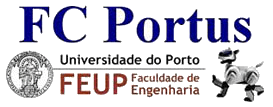 FC Portus |
Team Contact: Institutes: |
| Team Profile: | 3 Staff members and 3 Undergraduate students Short Description: FC Portus Legged League team is being developed by a research group with a long and successful experience in RoboCup (simulation, small-size and middle-size leagues) and results from the combined efforts of two research laboratories (LIACC and ISR-P) and from our previous teams (FC Portugal qdsimulation and coach leagues and 5DPO small and middle size leagues). The team includes several research innovations (like Strategic Positioning and Automatic Color Calibration) and is very flexible in its coordination methodologies and soccer playing strategies. In its first participation in RoboCup the team achieved the 5th position in Padova 2003. |
| Research Topics: | Multi-Agent Coordination, Flexible Team Strategies: Tactics, Roles and Formations, Strategic Positioning, Multi-Agent Communication, Intelligent Perception, Learning, Automatic Calibration. |
| Team Report: | Publications |
|
|
|
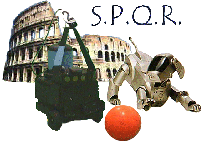 SPQR-legged |
Team Contact: Institutes: |
| Team Profile: | see http://www.dis.uniroma1.it/~spqr/history.html |
| Research Topics: | see spqrTDP.pdf |
| Team Report: | main2004.zip |
|
|
|
 ARAIBO |
Team Contact: Institutes: |
| Team Report: | ARAIBO_TechnicalReport2004.pdf |
|
|
|
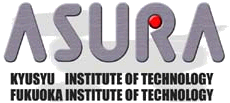 ASURA |
Team Contact: Institutes: |
| Team Profile: |
Our team was organized by KIT(Kyushu Institute of Technology) and FIT(Fukuoka Institute of Technology) in January of 2001. We have been successfully participating in the four-legged league of RoboCup since 2001.
|
| Research Topics: |
Distributed systems, Object oriented programming, Multi-agent systems, and Human-Computer interaction
|
| Team Report: | http://www.asura.ac/eng/documents/index.html |
|
|
|
 BabyTigers 2004 |
Team Contact: Institutes: |
| Team Profile: | We are participating from 1998. |
| Research Topics: |
Our topics are:
– observation strategy based on information criterion for a legged mobile robot,
– information sharing by a subjective map,
– motion and walking generation by genetic algorithm,
– stable color segmentation based on Monte Carlo localization method, and so on.
|
|
|
|
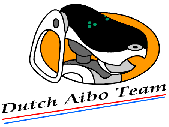 Dutch Aibo Team |
Team Contact: Institutes: |
| Team Profile: |
The Dutch AIBO Team was founded in November 2003 with our first AIBOs arriving by Christmas. We played our first official games at the German Open 2004 and are proud to have won one match.
|
| Research Topics: |
computer vision, world modeling, machine learning, collaborative robotics, opponent modeling
|
| Team Report: | DT2004-lisbon-report.pdf |
|
|
|
| Georgia Tech Yellow Jackets |
Team Contact: Institutes: |
|
|
|
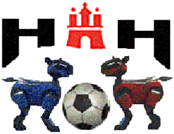 Hamburg Dog Bots |
Team Contact: Institutes:
Technische Informatiksysteme
|
| Team Profile: |
Team exists since October 2003, 3rd place in German Open 2004
|
| Research Topics: |
Teamwork, communication, cooperation, socionic
|
| Team Report: | TeamReportHDB2004.pdf |
|
|
|
 JollyPochie |
Team Contact: Institutes: |
| Team Profile: | We have just started in March of 2003, and we lost all games at RoboCup 2003 in Padova. We finished in fourth place at the 2004 Japan Open in May. |
| Research Topics: | Machine learning, machine discovery, data mining, image processing, string processing, software architecture, visualization. |
| Team Report: | JollyPochie2004TR.pdf |
|
|
|
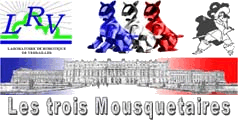 Les 3 Mousquetaires |
Team Contact: Institutes: |
| Team Profile: |
The French team
Les 3 Mousquetaires participates since 1998 in the RoboCup competition. In 1998 the legged league was just an exhibition that took place in Paris at La cité des Sciences. In 1999 the French team won the competition. It ranked second the next year in Melbourne. Fourth in 2001 in Seattle the French team keeps on participating even if the results are not as good as the previous years. |
| Research Topics: | The French Robotics Lab is specialized in legged locomotion, especially in the design of gaits and control, and in low level vision. Thanks to RoboCup the team now focuses on localization and multi-agent behaviors. Currently the coupling between locomotion and vision is investigated. Reports and documents related to the French Robocup participation and research since 1998 can be found at the following site: http://www.lrv.uvsq.fr/research/legged/robocup.php. |
| Team Report: | French_team_tech_report_2004.pdf |
|
|
|
 MetroBots |
Team Contact: Institutes: |
|
|
|
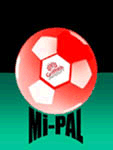 Mi-PAL Team Griffith |
Team Contact: Institutes: |
| Team Profile: | Team participating for the second time in RoboCup. Some members participated before in RoboCup, RoboCupJr and FIRA cup. |
| Research Topics: | Robotics for people. Vision. Software Architecture for Robotics. Team strategies. |
| Team Report: | report04.pdf |
|
|
|
 Team Chaos |
Team Contact: Institutes:
Center for Applied Autonomous Sensor Systems, Department of Technology
Blekinge Institute of Technology, Sweden
Department of Computing Science
Lund University, Sweden
Department of Information and Communication Engineering
University of Murcia, Spain
|
| Team Profile: |
Team Chaos, formerly Team Sweden, is a multi-university team which has been successfully competing in the four-legged league of RoboCup since 1999. This year, the four sites of activities are: Öòebro University – Sweden (coordinating node), Blekinge Institute of Technology – Sweden, Lund University – Sweden, and theUniversity of Murcia – Spain. The distributed character of Team Chaos has made the project organization demanding, but has resulted in a rewarding scientific and human cooperation.
|
| Research Topics: |
We approach the RoboCup problem as an entertaining way to do team research work which involves important scientific challenges. Our main scientific focus is the integration of higher level cognitive processes with physical activity in the real world. Our practical goal is to develop general principles and algorithms for intelligent autonomous robotics that can be used in different robots and in different domains.
Some of the distinctive aspects of our approach are: (i) a general, principled architecture for autonomous systems;(ii) hierarchical fuzzy behaviors for fast incremental development of robust behaviors;(iii) fuzzy landmark-based localization for efficient, fault-tolerant self-localization;(iv) an effective cooperative object localization technique (also based on fuzzy logic);and (v) robust vision-based perception, coupled with active perceptual anchoring, for effective object detection.
|
| Team Report: | ftp://aass.oru.se/pub/robocup/teamchaos04.pdf |
|
|
|
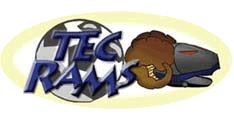 TecRAMS-Mexico |
Team Contact: Institutes: |
| Team Profile: | First participation in RoboCup 2002 Fukuoka Japan Second participation: 2003 First American Open, Pittsburgh USA Third participation: RoboCup 2003 Padova Italy Fourth participation: RoboCup 2004 Lisbon Portugal |
| Research Topics: | Dynamic equilibrium. Normally all dynamic walking algorithms consider robot as a dynamic system. We are modeling 3D position of robot’s gravity center depending of all torques applied to it. Afterwards, control strategies will be used for control its center of gravity position Localization algorithms without colored beacons. We have developed a localization algorithm that should work without the use of beacons, field lines will be used to find the points for localization. Invariant light condition for color segmentation. We are researching algorithms for segmenting images regarding of shadows, light conditions and noise. It should be able to be ported to systems such like YUV or RGB. Enhanced virtual reality. We are planning to develop an enhanced virtual reality field that will allow us to test our four sony robots in competition against four simulated robots. Team strategies acquisition. We have developed distributed reinforcement learning algorithms for team strategies acquisition and used a Nash equilibrium model to make rational decisions among the robots. Those algorithms were tested in a simulator and we intend to test them in the Aiboqks. |
| Team Report: | http://www.cem.itesm.mx/robocup/TecRams-TeamReport2004.pdf |
|
|
|
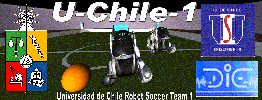 U-Chile 1 |
Team Contact: Institutes: |
| Team Profile: |
Team creation December 2002.
First participation: RoboCup 2003, Padova, Italy.
Second participation: RoboCup 2004, Lisbon, Portugal.
Detailed team profile in
http://www.robocup.cl/four.htm |
| Research Topics: |
Evolutionary robotics, adaptive learning, learning from simulations and collaborative robotics.Relevant publications in
http://www.robocup.cl/four/publications.htm |
| Team Report: | UChile1_Technical_Report_2004.pdf |
|
|
|
 UT Austin Villa 2004 |
Team Contact: Institutes: |
| Team Profile: |
Our team started as a class project in January of 2003. At RoboCup 2003 in Padua, our goal was just to participate. We lost all of our official games, though were able to win some exhibitions and achieved the fourth highest result in the challenge competition, including the second highest score in the obstacle avoidance challenge. We finished in third place at the 2004 US Open in April, and hope to be in the thick of the competition at RoboCup 2004.
|
| Research Topics: |
Machine learning, Multiagent systems, Learned locomotion and ball capturing, Robust vision, color constancy, Automatic sensor-action model callibration
|
| Team Report: | http://www.cs.utexas.edu/~AustinVilla/?pi=Villa04-legged-tech |
|
|
|
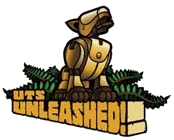 UTS Unleashed! |
Team Contact: Institutes: |
| Team Profile: | UTS Unleashed! |
| Research Topics: |
Knowledge Representation and Reasoning, Conceptual Spaces, Colloboration, Agent Oriented Software Engineering, Belief Revision
|
|
|
|
